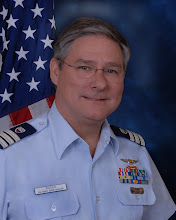As we approach the one-year anniversary of the loss of a Coast Guard HH-65 and her four crewmen on 28 February 2012, let us remember them. Let us each take this opportunity to rededicate ourselves to the flight discipline and the discipline in judgement that our profession demands of us each day we fly. It is only when we do that their sacrifice is not in vain.
I wrote the piece below on the way home from the crew's memorial service last year. I share it herewith in hope that it will have meaning for all who read it.
_______________________
08 March
2012
OVER THE
NORTHEAST GULF OF MEXICO - As I sit in my seat at 17,000 feet, cruising along
serenely in the sunlight, I reflect on events of earlier in the day wistfully
and with gratitude for the privilege of having been there. I am returning, along with my shipmates from
CG Air Station Miami, from the memorial service for the crew of CG 6535 - the
helicopter that was lost this past week in Mobile Bay. It was a magnificent service. Upwards of 3,000 Coast Guard members and
their families were there, along with members of many of our partner agencies. They sky was overcast and gray, with a hint
of chill and a threat of rain the air - most fitting for such a somber
occasion. The Commandant of the Coast
Guard was there, along with an Assistant Secretary for the Department of
Homeland Security, several other Admirals, air station commanding officers, and
others.
This was
a most moving experience for many reasons.
For many of these same reasons, this event has shaken Coast Guard
Aviation to its very core. This accident
happened in a relatively controlled training environment. The instructor was one of the Coast Guard's
most experienced and highly regarded instructors and evaluators. It was the trainee's final flight before
certification - a trainee who had been a star officer and a star student. It
happened in a training program that, despite the dangers and complexities of
the missions for which they train, had not had a fatal mishap since 1981 -
before many current CG pilots were even born - and even that accident had been
caused by a mechanical failure. Thus the
usual suspects for causal factors regarding skill, or knowledge, or performance,
or even of discipline seem not to be present.
Such would make much easier the task of contemplating this horrific
event.
No... None
of these easy answers seems readily available.
We are left, then, to contemplate the significance of this event for
those of us left behind. It is a demonstration
that it can happen to any of us. Each of
us thinks we are at minimum good, competent, skilled aviators who exercise
sound judgment in decision-making when we fly.
So did they. We each strive to
learn something from every time we take one of these amazing contraptions into
the air. So did they. Those of us who instruct and/or evaluate
endeavor to look at these factors when we fly with our aviators and attempt to
impart some of that knowledge to them.
So did LCDR Taylor.
But...
despite all of the good and wonderful things we heard today about these men,
their supreme competence, knowledge, and skill, their mission last Tuesday
night somehow ended in tragedy - and we're still here. As for the specific reasons, a team of
experts is already hard at work to figure that out. Their painstaking work will take months. We must give them the room to do that
job. They will figure it out, and then
we will know.
But what
are we to do in the meantime? How do we
go out tomorrow to do that same job - knowing that we are not any better, more
competent or skilled, than they? More
importantly, how do we do so and have an expectation of a different outcome?
I submit
that we begin by recognizing that we are not any better. We are not immune. We are as vulnerable and flawed as any who
have gone before - including the crew of 6535.
We then resolve to renew our commitment to personal
self-accountability. Accountability in
decision-making, accountability in performance, accountability in how we deal
with those around us - our crewmates, our shipmates, and our families. We acknowledge that every time we strap
ourselves into one of those machines, we're all-in. We're playing for all the marbles.
The men
of 6535 did not know this was their last flight - or their last day on Earth,
for that matter. Yet, from what we
learned about them today, it seems that they conducted their lives as if they
did. They quietly, without a lot of fuss,
went about living lives of excellence and commitment on a daily basis. Their example can be a lesson for the rest of
us if we are open to learning and personal growth. Let it be so for those of us in Auxiliary
Aviation. Let it be so for those of us in
the entire Coast Guard family. Let this
be our way of honoring the memory of our fallen shipmates.
I know
that it shall be so for me.
God be
with you, my shipmates - until we meet again.

